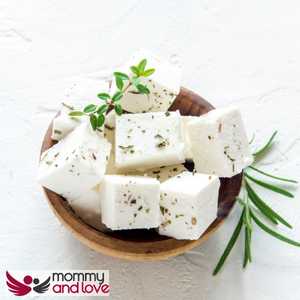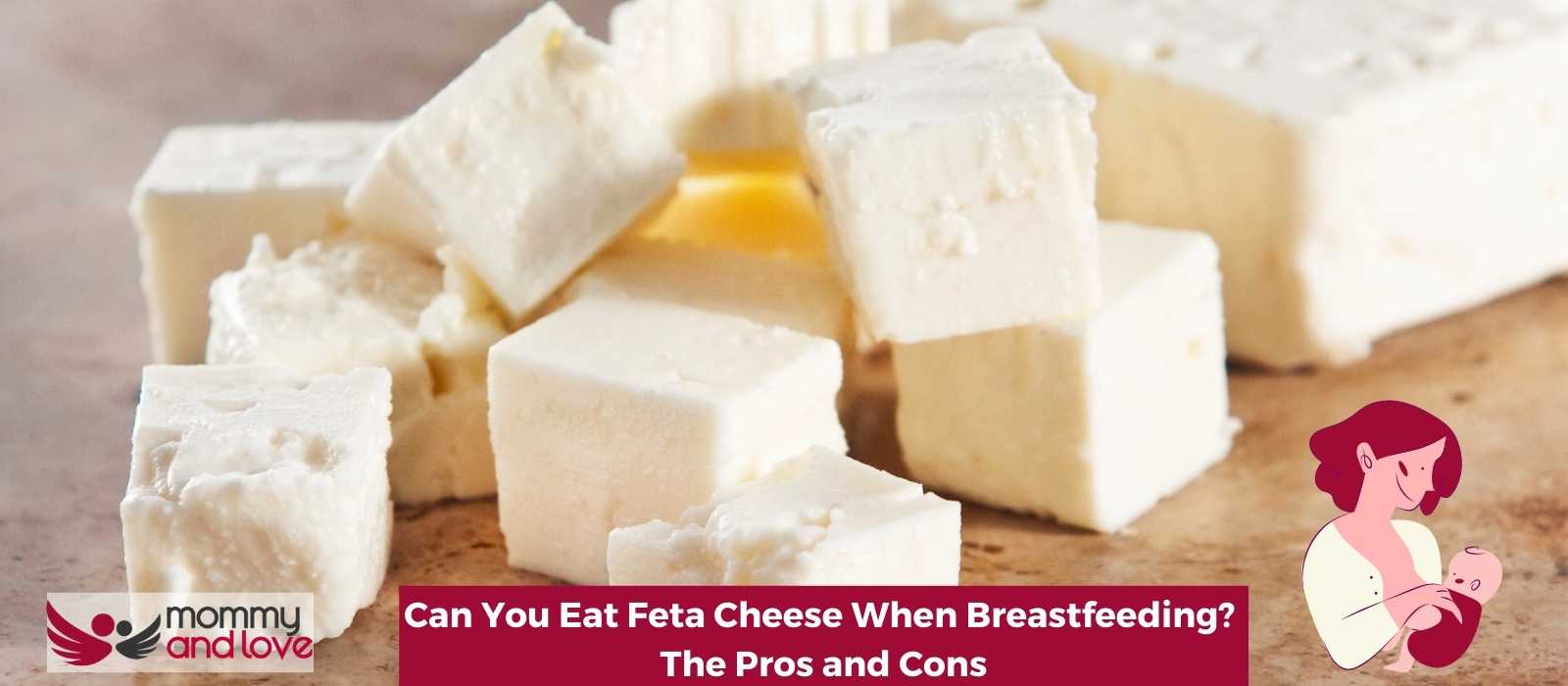If you are a breastfeeding mom, you may be wondering if it is safe to eat feta. This question is not as easy to answer as you might think. The truth is, there are pros and cons to eating feta while breastfeeding.
In this guide, we will take a closer look at both sides of the argument so that you can make an informed decision about whether or not to eat this type of cheese.
So, can you eat feta when breastfeeding? The answer is yes, but in moderation. Feta is a high-sodium food that can cause dehydration and electrolyte imbalance in infants. However, as long as mothers eat feta in moderation, it should not pose any problems for their infants.
What Is Feta Cheese?

Feta is a type of cheese that originated in Greece. It is made from sheep’s milk or a combination of sheep’s and goat’s milk. It is a soft cheese with a slightly grainy texture and a tangy, salty flavor.
This cheese is brined in salt water to give it its signature tangy taste, and it ages from two to three months to develop its characteristic flavor.
Feta can be eaten by itself or paired with other foods such as fruits, vegetables, pastas and more.
What Are the Health Benefits of Eating Feta While Breastfeeding?
Feta is an excellent source of calcium, which helps strengthen bones and teeth. It also contains phosphorus, zinc, vitamin B12 and riboflavin.
It has lower fat content than many other cheeses, making it ideal for those watching their weight.
Eating cheese while breastfeeding can offer the following benefits:
Nutrients
Feta contains several nutrients that are essential for the health of the mother and baby, including protein, calcium, vitamin B12 and zinc. These nutrients help promote healthy cell growth and development in both lactating mothers and their babies.
Healthier Bones

Feta is a good source of calcium and vitamin D, which are important for bone growth and development in infants.
Research has shown that breastmilk from mothers who eat enough calcium actually contains higher concentrations of this mineral than milk from mothers who do not consume enough calcium.
Furthermore, babies can receive up to 50 percent of their daily calcium requirement from breastmilk alone if their mothers consume enough calcium (2).
Immune System Support
Vitamin A is an important nutrient for immune system function and vision development in infants. It also helps promote healthy cell growth in both the mother and baby. Vitamin A plays a key role in vision development in babies.
What Are the Cons of Eating Feta While Breastfeeding?
There are a few potential drawbacks to eating feta while breastfeeding.
First, it is possible that the strong flavor of feta could lead to your baby becoming fussy or rejecting your breastmilk.
Additionally, if you are sensitive to dairy products, eating feta could cause you to experience some uncomfortable side effects, such as gas or bloating.
Finally, feta is relatively high in sodium, so eating too much of it could cause you to retain water and feel bloated.
Can I Eat Cheese While Breastfeeding?
Yes, you can eat soft cheeses while breastfeeding provided that they are made from pasteurized milk! There are no hard and fast rules about what you can and cannot eat while breastfeeding. However, some mothers worry that eating certain foods will cause gas or upset stomach in their baby.
If you are worried about this, start by eating small amounts of cheese. It can be any of these cheeses – blue cheese, cottage cheese, cheddar cheese, organic cheese, grass-fed cheese, queso blanco or cream cheese.
Avoid unpasteurized soft cheeses because they are dangerous to you and your baby’s health.
Also, lactating mothers should be careful when buying cheese and other milk products from local farms because they might contain listeria organism.
Watch for any changes in your baby’s behavior after you eat blue cheese which is made from molds. If your baby seems fussy or has gas, you may want to avoid that food for a few days and try again later.
How Much Feta Can I Have While Breastfeeding?
It is generally recommended that breastfeeding women consume no more than two ounces of feta per day. This is because feta has high sodium content which can cause dehydration and electrolyte imbalance in infants.
However, as long as breastfeeding mothers eat feta in moderation, it should not pose any problems for their infants.
Can Cheese Affect the Quality of Breast Milk?
Cheese is a dairy product that is made from milk curd. It is a source of protein and calcium, and it also contains a range of other nutrients.
Some research has suggested that consuming cheese may help to increase the quality of breast milk. One study found that women who ate cheese had higher levels of omega-3 fatty acids in their breastmilk than those who did not eat cheese.
Omega-3 fatty acids are important for infant brain development, and they may also help to protect against allergies and gastrointestinal problems.
Another study found that mothers who ate grass-fed cheese had higher levels of conjugated linoleic acid in their breast milk.
This fatty acid has been linked to a range of health benefits, including reduced inflammation and improved blood sugar control.
Can Cheese Increase Breast Milk Production?
A mother’s diet can have a direct impact on her breast milk supply. This includes the amount of milk she produces as well as the quality of the milk.
One food that has been shown to have an effect on breastmilk supply is soft cheeses. Cheese is a high-fat food, and consuming too much of it can lead to a decrease in milk production.
In addition, cheese contains a substance called casein, which can make breast milk harder to digest.
As a result, mothers who consume large amounts of cheese may find that their babies have difficulty gaining weight or experience digestive problems.
While some amount of cheese can be part of a healthy diet for nursing mothers, it is important to limit consumption in order to maintain a good breast milk supply.
What Foods Can Upset a Breastfed Baby?
Breastfed babies can be sensitive to certain foods that their mothers eat. Here are a few foods and drinks that you can avoid while breastfeeding:
- Common culprits include cow’s milk, soy, wheat, eggs, peanuts, and fish. When these foods are consumed by the mother, they can be passed into her breast milk and cause digestive upset for her breastfeeding baby.
- Eating fish, especially those with high mercury content is not advisable because it might enter your baby’s system. Most fish has mercury content and it is important to know which ones to avoid.
- It is generally okay for nursing mothers to eat spicy food. However, there are spicy foods with strong flavors that can make a baby gassy.
- Caffeine intake should be limited. It can be found in many foods and drinks so watch out for what you consume.
- Unpasteurized milk should be avoided because it can cause health conditions for you and your baby.
- Similarly, alcohol consumption should also be moderate or none at all as advised by the Centers for Disease Control and Prevention. Regardless of how much alcohol you drink, it’s not recommended during breastfeeding.
- Another food to avoid while breastfeeding and considered a common allergen for babies is nuts so be careful when you eat peanuts especially if you have a family history of allergies.
- Herbal supplements have not been studied extensively and they are not properly regulated so it’s better to stay away from them.
- Avoid eating hot dogs and other processed foods that contain unhealthy, saturated fat.
- Symptoms may include abdominal pain, diarrhea, vomiting, and rash. In some cases, food sensitivities can also cause fussiness, irritability in the baby’s gut, and sleep problems.
If your breastfed baby reacts to something you’ve eaten, it’s important to speak with a medical professional or a lactation consultant. They can help you identify the problem and make dietary changes that will allow you to continue breastfeeding successfully.
Overall, a mother’s milk is the primary source of nutrition for a baby which is why it’s important to have a varied diet. A well-balanced diet should consist of natural sweeteners, fruits and vegetables.
Take Away on Eating Feta Cheese Whilst Lactating
Whilst its safe to eat during nursing, itt’s best to avoid eating feta cheese while you’re breastfeeding. This is because it contains a substance called casein, which can make breast milk harder to digest.
Additionally, feta cheese is high in fat, and consuming too much of it can lead to a decrease in milk production. If you do eat feta cheese, be sure to do so in moderation.
And, as always, if your breastfed baby reacts to something you’ve eaten, speak with a medical professional or lactation consultant. They can help you identify the problem and make dietary changes that will allow you to continue breastfeeding successfully.
Thanks for reading! We hope this was helpful. 🙂

This article was written by Sandra Baker – full time writer and the mother of four amazing kids (including twins!)
She’s also a breastfeeding counselor and has spent years helping new parents learn how to care for their children. When she’s not writing or caring for her children, Sandra likes to spend time reading and taking walks with her husband.




